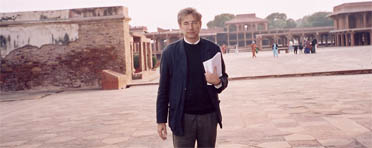For weeks, the New Yorkers in my mail stack pile up and I read nothing in them more than a couple Talk of the Town pieces and a book review or two by John Updike or Louis Menand. Then, all of a sudden, an issue comes along that demands to be read in near entirety. Friends, the December 25/January 1 Winter Fiction issue is one such issue, and its highlight is Orhan Pamuk’s Nobel lecture. Anyone who cares about anything should read it.

The narrative begins when Pamuk’s father delivers to him a suitcase filled with his writings, which launches Pamuk into a meditation on his decision to become a writer and his father’s decision to not.
A writer is someone who spends years patiently trying to discover the second being inside him, and the world that makes him who he is. When I speak of writing, the image that comes first to my mind is not a novel, a poem, or a literary tradition; it is the person who shuts himself up in a room, sits down at a table, and, alone, turns inward. Amid his shadows, he builds a new world with words.
….
I would like to see myself as belonging to the tradition of writers who—wherever they are in the world, East or West—cut themselves off from society and shut themselves up in their rooms with their books; this is the starting point of true literature.
But once we have shut ourselves away we soon discover that we are not as alone as we thought. We are in the company of the words of those who came before us, of other people’s stories, other people’s books—the thing we call tradition. I believe literature to be the most valuable tool that humanity has found in its quest to understand itself. Societies, tribes, and peoples grow more intelligent, richer, and more advanced as they pay attention to the troubled words of their authors—and, as we all know, the burning of books and the denigration of writers are both signs that dark and improvident times are upon us. But literature is never just a national concern. The writer who shuts himself up in a room and goes on a journey inside himself will, over the years, discover literature’s eternal rule: he must have the artistry to tell his own stories as if they were other people’s stories, and to tell other people’s stories as if they were his own, for that is what literature is.
One of my favorite passages in the piece comes when Pamuk responds to the question, “Why do you write?” with every possible reason I’ve ever considered and then some.
I write because I have an innate need to write. I write because I can’t do normal work as other people do. I write because I want to read books like the ones I write. I write because I am angry at everyone. I write because I love sitting in a room all day writing. I write because I can partake of real life only by changing it. I write because I want others, the whole world, to know what sort of life we lived, and continue to live, in Istanbul, in Turkey. I write because I love the smell of paper, pen, and ink. I write because I believe in literature, in the art of the novel, more than I believe in anything else. I write because it is a habit, a passion. I write because I am afraid of being forgotten. I write because I like the glory and interest that writing brings. I write to be alone. Perhaps I write because I hope to understand why I am so very, very angry at everyone. I write because I like to be read. I write because once I have begun a novel, an essay, a page I want to finish it. I write because everyone expects me to write. I write because I have a childish belief in the immortality of libraries, and in the way my books sit on the shelf. I write because it is exciting to turn all life’s beauties and riches into words. I write not to tell a story but to compose a story. I write because I wish to escape from the foreboding that there is a place I must go but—as in a dream—can’t quite get to. I write because I have never managed to be happy. I write to be happy.
“MY FATHER’S SUITCASE” was read en route flying from pallid Buffalo, New York to the intellectual isolation of Los Angeles. We Angelenos are prone to hide our passions when it comes to honoring the written word. I was stunned by the simple and direct honesty of Pamuk’s lecture. His words made an emotional connection not only to the personal experience of reading my own father’s sermons after he died three years ago but also to my own feeble but driven attempts at writing. I extend a huge thank you to Orhan Pamuk for re-igniting my committment to writing.
Comment by Joseph Clapsaddle — 12/30/2006 @ 5:55 pm